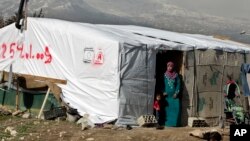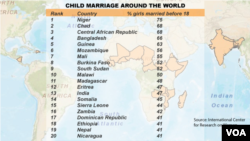Pressured into marriage by her parents as part of a desperate effort to survive, Safia has given up on the dream she once had.
“I wanted to continue my education and my life,” the 16-year-old, who is married to Omar, a man nearly a decade older than her, told VOA.
“I wanted to be a teacher, but my ambitions don’t exist any more.”
Safia is one of a growing number of refugees in Lebanon for whom finding a husband was not a matter of choice but of economic necessity.
Torn away from their livelihoods and homes by war, families struggling to provide for their children have, in recent years, increasingly looked to marriage as an answer.
And with bride and groom sometimes no older than their early teens, the dangers for those involved can be high.
Transferring the burden
Child marriage in the region pre-dates the outbreak of the Syrian war.
According to UNICEF in 2009, six percent of women aged 20-24 in Lebanon had married under the age of 18 – a practice mainly limited to certain poor, rural parts of the country - while the pre-conflict figure within Syria was 13 percent.
However, the devastating impact of the war on the displaced has driven up the numbers, says UNICEF child protection officer Nisrine Tawily Najjar.
“The main drivers are prolonged displacement, and it can be a strategy for economic survival,” Najjar said. “It is seen as a way of reducing the economic burden on the families. However, it is simply transferring the burden from the caregivers to the child themselves."
Close to home
It is a circumstance all too familiar for Safia’s parents.
The family had lived comfortably in Raqqa, Syria – the Islamic State group's self-proclaimed "caliphate" - until they were driven out by conflict in 2013.
Sitting next to Safia, her mother Sabah explained that her husband Tarek, formerly in the construction business, had not been able to find a job for the last year.
Now relying on U.N. handouts to feed their 10 children, Sabah explained she and Tarek pushed their daughter into marriage despite their own deep misgivings, and despite Safia’s initial tearful objections.
“She is still a child, and getting married is a big responsibility. She doesn’t know how to deal with family problems, or her husband, who has needs.”
Marriage is often seen by parents as a way of ensuring their child’s stability and protecting their child from the threat of sexual violence.
But Najjar argued that for girls especially – the husband is often still young, but older than the wife - such marriages close off access to education and the prospect of employment.
Marriage also brings with it the risk of sexual trauma and health problems, especially in childbirth.
Just days before speaking to VOA, Safia had suffered a miscarriage.
The risk of complications, as well as maternal mortality and infant mortality, are far higher among these young girls, Najjar added.
Currently there is no legislation in Lebanon setting a minimum age to marry, and an attempt last year to introduce a bill making the practice more difficult has so far failed to be passed into law.
In place of any laws, approval over marriages is often given by the religious leader in a community.
Tackling the taboos
With under reporting of child marriages common and reliable statistics sorely lacking, the Ministry of Social Affairs is set to back more in-depth research into the topic later this year.
UNICEF’S Najjar said the organization is working with Lebanese NGO KAFA on a gender-based violence program that addresses child marriage.
KAFA’s Eliana Aslan explained that the program, which includes interactive games between children and the women that care for them as a way of broaching taboo subjects, had seen some success.
However, a number of major hurdles exist for those like KAFA, whose program has reached around 5,000 of what some estimate to be more than 1.5 million refugees in the country.
“Many of the mothers are cooperative, and know that what we’re saying is in some way right, but the mother does not have power like the father does," Aslan said.
“We have to engage men to have the best impact regarding this issue” she said, adding that men were often unwilling to be involved in such programs.
And though the efforts of those like KAFA have helped, it is likely they will only be able to do so much while refugees continue to face poverty.
For Safia, who participated in the sessions with her mother, education on the matter did not prevent her marriage from taking place.
Now with her family in their tented settlement in the Beka'a region after a month living with her husband in Beirut as he unsuccessfully sought a job, she told VOA:
“They didn’t have an impact. Even after the sessions I still had to get married.”
*The names of Safia and her family have been changed to protect their identity





